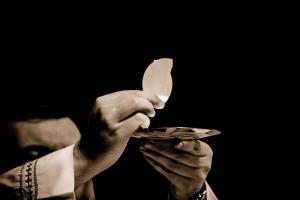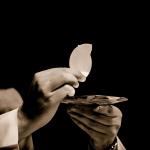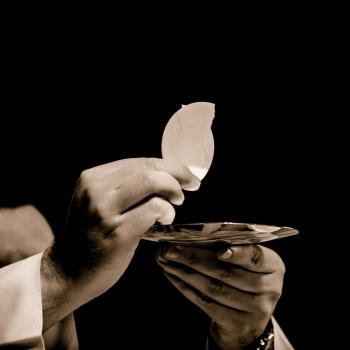
In our series on Discovering a Eucharistic Spirituality, today’s article focuses on the declaration, “Christ, our Passover, is sacrificed for us.”
Barbara Mauer was the most formidable teacher that I had in high school. She taught literature, English, and Latin for thirty-two years. And I had her for a class that took us through the whole of the Iliad and the Odyssey. There was a time when I thought that if I heard another reference to “grey eyed Athena” one more time, I would evaporate.
She also taught us to read stories. Each has a plot or a storyline. And every plot has five elements: exposition or introduction, rising action or what used to be called complication, climax, falling action or dénouement (it’s much fancier in French), and resolution.
Although it’s important to remember that the whole of the Eucharist is a prayer. It can also be read as a story. It even starts at the very beginning of everything. With God and God’s activity as creator.
But here I would like to focus on what could be described as the climax: The bread is broken, the priest declares, “Alleluia! Christ our Passover is sacrificed for us.” The people respond, “Therefore, let us keep the feast. Alleluia!” And as preparation for the rest of the story, the priest lifts the elements and declares, “The gifts of God for the people of God. Take them in remembrance that Christ died for you and feed on him in your hearts with faith and thanksgiving.”
This climax – these words – appear every Sunday, no matter where the liturgy begins. It doesn’t matter if we use Rite One (the King Jamesy version) or Rite Two (the – sort of – contemporary version). It doesn’t matter whether we use Prayer One or Two of Rite One. It doesn’t matter whether we use Prayer A, B, C, or D in Rite Two. All those words, all that storytelling and it always reaches a climax in the same place.
Does that matter? Of course it does. As I am sure Mrs. Mauer would have pointed out, knowing where the story reaches its climax is the key to understanding its meaning. And that is no less true of the Eucharist’s story.
But do we understand what that climax means? Well, that’s a different matter. And I am afraid that all too often, the average Christian doesn’t have a clue. In part because we don’t talk about it often enough.
So, let’s do that here, because in our quest for spiritual lives shaped by the Eucharist, understanding this one moment in the story is the key to a different kind of spiritual life.
First, notice that in breaking bread and in lifting the cup, we are re-presenting the crucifixion – the sacrifice made by Jesus on the cross. This inevitably means that the saving moment in human history is the crucifixion. It is the watershed, the continental divide, the axis on which everything turns. Everything leading up to that moment was anticipation and plot development. On the other side of it everything is different.
Second, note that this sacrifice is not some free-standing moment in human history without precedent. Instead, when we lift the bread and wine, we declare, “Christ our Passover is sacrificed for us.” In other words, our story is the story of ancient Judaism and specifically, the story of the Exodus from Egypt.
God creates the world. Humankind is made in God’s image. Our desire to be our own gods subjects us to the tyranny of death. And in the middle of that complex story of sin, violence, malevolence, and destruction, God chooses Israel to chart a way through life for us all. But to make that possible, first he has to liberate his people from enslavement to Egypt’s Pharoah, who is both a real-life tyrant and a symbol of death’s tyranny over humanity.
When he refuses to acknowledge God’s supremacy, when he asserts his own divinity over that of the one, true God, he learns through a series of plagues what it means to ignore the fact that there is a God and we are not. And the last of those plagues involves the angel of death claiming Egypt’s first-born sons.
Why first-born sons? Because, in the ancient world, they were the vehicle for transmitting inheritance from one generation to the next. They were a society’s claim to a past and the bridge to its future. And — particularly in Pharoah’s case — they were the key to making a god-like claim – to a past without peers and a future without end.
In the middle of this confrontation between Israel’s God and the god of Egypt, both Israel’s first born – and with them, Israel’s future, life, and liberty – are guaranteed by the sacrifice of a lamb, whose blood is smeared on the doorpost of their homes. It is important to note, though, that we miss the meaning of the story if we focus on who dies.
The meaning of the Passover celebration is not that some people die and God’s special people don’t. The meaning of the Passover story is that the world is marked by death and slavery to the tyranny of death in many forms, including rulers, and there is one way through to life, dependence upon God.
During Jewish celebrations of the Passover, this truth is brought home over and over again. At one point the ritual reads:
Blessed is the Omnipresent One, blessed be He! Blessed is He who gave the Torah to His people Israel, blessed be He! The Torah speaks of four children: One is wise, one is wicked, one is simple and one does not know how to ask.
The wise one, what does he say? “What are the testimonies, the statutes and the laws which the L‑rd, our G‑d, has commanded you?” You, in turn, shall instruct him in the laws of Passover…
The wicked one, what does he say? “What is this service to you?!” He says `to you,’ but not to him! By thus excluding himself from the community he has denied that which is fundamental. You, therefore, blunt his teeth and say to him: “It is because of this that the L‑rd did for me when I left Egypt”; `for me’ – but not for him! If he had been there, he would not have been redeemed!”
The simpleton, what does he say? “What is this?” Thus you shall say to him: “With a strong hand the L‑rd took us out of Egypt, from the house of slaves.”
As for the one who does not know how to ask, you must initiate him, as it is said: “You shall tell your child on that day, `It is because of this that the L‑rd did for me when I left Egypt.'”
Every response — the one given to the wise, the wicked, the simple, and the ignorant — is essentially the same. The key to life is dependence upon God’s act of deliverance.
Now, the story of Eucharist is a part of the same plot and it makes the same claim when we announce, “Christ our Passover is sacrificed for us!” But, in our case, there are two critical differences: One is that in Jesus, God is both deliverer and sacrificial lamb and the other is this: While the Jewish Passover celebration makes only one or two allusions to the Messiah, by combining the images of God as both sacrifice and deliverer, our liturgy announces the fulfillment of that which is only anticipated in the Passover ritual.
So, what does all of this imply about our spiritual lives?
Well, one implication is that we are, as Christians, completely and utterly dependent upon God in Jesus Christ. As what the Eucharist calls, “the author of our salvation”, Jesus is the one who breaks the power of death and establishes the path to eternal life. We cannot save ourselves. And practically speaking, we should treat the moments that we find ourselves at the limits of our strength as an opportunity to put our lives back into God’s hands.
Our physical strength often fails us. Our minds can fail us as well. Our wealth cannot meet every need. More often than not, money cannot address our deepest needs. We cannot completely protect those we love the most. We cannot make choices for them. We cannot control the future and we cannot rewrite the past.
This realization leads us to another: We cannot be good enough that we don’t need the forgiveness and mercy of God. The Israelites discovered this after they were delivered from the Pharoah’s tyranny. In the desert they were forced to face themselves: their avarice; their desire to have their every need met; the ease with which they could forget God and embrace the tyranny of other would-be gods.
We may think that this is the stuff of old biblical stories but it isn’t. It is the story of every human being. It is us when we want what we want, and we resist the discipline of character and virtue. It is us when we compromise our principles. It is us when we let the simple gifts of life crowd out the deep joys of life that arise from the discipline of prayer and worship.
The Eucharistic life is also a life that roots out idolatry. The ancient Passover ritual only mentions Moses once and we only mention one other human being – Mary – in the Eucharist. Jewish scholars observe that this is because the ancient Passover ritual is designed to remind the Jewish people that God, not any human agency delivered his people. And much could be said about the single reference to Mary.
Idolatry may seem like a sin that belongs to a time and place far away as well. But it is not, as is evident in this election season.
Think as you will about the choice, but don’t let presidents loom so large in your thinking that – as we have been praying – the only one we serve with our hearts and minds is the Prince of Peace. The Exodus is not a story of escape from the abuses of one regime to the blessings of a new regime. It is the story of deliverance from the tyranny of that which-is-not-God to the liberation of life in relationship with the-one-who-is-God.
Another aspect of a Eucharistic spirituality is this: Just as our lives depend upon Christ’s sacrifice, the nature of the Christian journey is itself, sacrificial. Not in the sense that we can accomplish what Christ accomplished. But even Jesus called on his disciples to pick up their crosses.
Far too much preaching on the Christian life is about a sanctified self-help. The power of positive thinking with a dose of liturgy. But nothing could be further from the truth.
Without being glum or self-destructive, the Eucharist is about a very different kind of life. A life shared with Jesus. And a path is marked by his openness to others, the willingness to give, the capacity for sacrifice, and a vision of healing made available to all who long for it and seek it.
This is the plot of our lives, our path, our purpose. It is the commitment we should bring to our relationships – to our marriages, to our families, to the values we give our children — to our friendships, to our work – to life itself. And the celebration of the Eucharist is the spiritual discipline given to us by Christ, to remind us of that obligation — to shape and reshape our lives.
Gracious God, we have found our Passover in Jesus Christ your Son, who is both sacrifice and deliverer. Deepen our lives in him that we may learn to trust you, learn to worship you, and learn to devote ourselves to your Son’s path. That in eating his flesh and his blood, we may learn anew what it means to be alive, what it means to serve, what it means to love. And for all that you do in and through us, we will give you the praise in the name of your Son, our Savior, Jesus the Christ and Passover lamb, who lives and reigns with you and the Holy Spirit, one God, now and forever. Amen.












